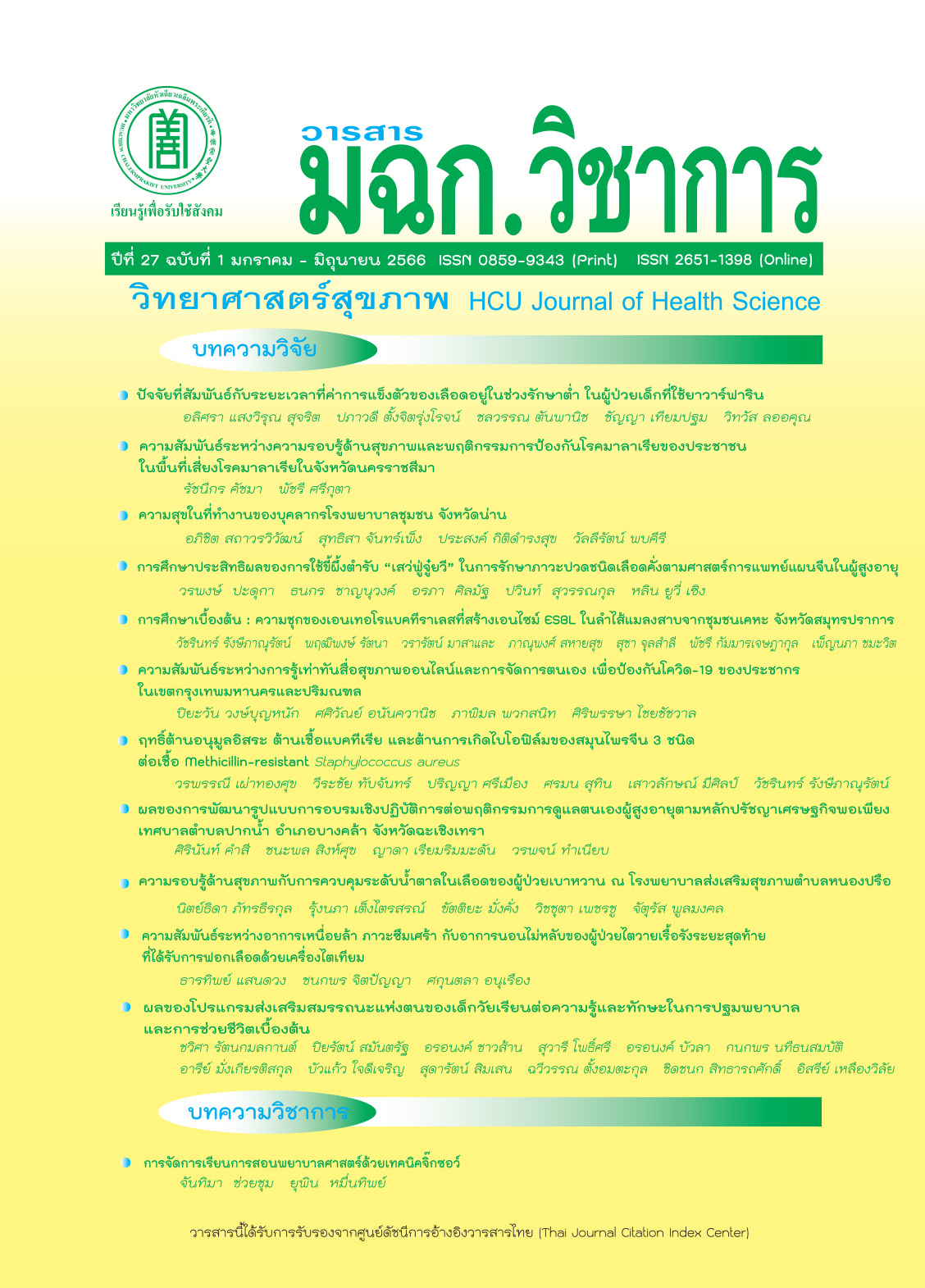The Relationship Between eHealth Literacy and Self-Management in COVID-19 Prevention of the Population in Bangkok and the Metropolitan Region
Keywords:
eHealth literacy, self-management, COVID-19Abstract
The objective was to study eHealth literacy and self-management in COVID-19 prevention and the relationship between eHealth literacy and self-management in COVID-19 prevention of the population in Bangkok, Nonthaburi, Pathum Thani, and Samut Prakan. This study used online self-administrative questionnaires as a tool to collect information. The 415 samples in this study were calculated using the Taro Yamane method. Data were collected from March to October 2020.
The results found that the sample had an average score of eHealth literacy at 4.02 ± 0.70, a high level. For the gender differences, there was no difference in the level of eHealth literacy (p-value = 0.667). The age differences, education levels, and occupations had different levels of eHealth literacy (p-value < 0.001, 0.029, and 0.032, respectively). The self-management in COVID-19 protection of samples had an average score of 4.08 ± 0.59 which is a high level. The different ages had different levels of self-management in COVID-19 prevention (p-value = 0.012). The gender differences, education levels and occupations had no difference in self-management in COVID-19 prevention (p-value = 0.240, 0.494, and 0.103, respectively). The relationship between eHealth literacy and self-management in COVID-19 prevention from the analysis of Pearson correlation (r) of 0.277 (p-value < 0.001) showed a positive correlation meaning that if there were more eHealth literacy, there would have been good self-management on COVID-19 protection.
Downloads
References
World Health Organization. Coronavirus [Internet]. 2020 [cited 2020 April 11]. Available from: https://www.who.int/thailand/health-topics/coronavirus
Unicef Thailand. Coronavirus disease (COVID-19): what parents should know [Internet]. 2020 [cited 2020 April 11]. Available from: https://www.unicef.org/thailand/stories/coronavirus-disease-covid-19-what-parents-should-know
TWF Agency. Thailand internet user statistics and behavior Q1 year 2020 [Internet]. 2020 [cited 2020 April 11]. Available from: https://www.twfdigital.com/blog/2020/02/thailand-internet-users-stat-q1-2020/
Sap-in R, Khaoroptham Y. The elderly and Media in Thailand. Dhurakij Pundit Communication Arts Journal 2017;2:367-87.
Norman C, Skinner H. eHealth literacy: essential skills for consumer health in a networked world. Journal of Medical Internet Research 2006;8(2):e9.
Norman C, Skinner H. eHEALS: the eHealth literacy scale. Journal of Medical Internet Research 2006;8(4):e27.
Thai Health Promotion Foundation. Fight! Covid-19 together: self-care guide for people [Internet]. 2020 [cited 2020 April 11]. Available from: https://resourcecenter.thaihealth.or.th/files/66/%E0%B8%AA%E0%B8%B9%E0%B9%89%20%E0%B9%82%E0%B8%84%E0%B8%A7%E0%B8%B4%E0%B8%94%20e-book_update.pdf
Department of Disease Control. Guidelines during quarantine or home isolation [Internet]. 2020 [cited 2020 May 9]. Available from: https://ddc.moph.go.th/viralpneumonia/file/int_protection/int_protection01.pdf
World Health Organization (Thailand). Advice on the use of medical masks in the community, during home and in health care settings in the context of the novel coronavirus (2019-nCoV) outbreak [Internet] 2020 [cited 2020 April 11]. Available from: https://apps.who.int/iris/bitstream/handle/10665/330987/WHO-nCov-IPC_Masks-2020.1-eng.pdf?sequence=1&isAllowed=y
Registration statistics. Provincial population statistics [Internet]. 2020 [cited 2020 April 17]. Available from: https://stat.bora.dopa.go.th/stat/statnew/statMenu/newStat/home.php
Ubonrasamee S. Media exposure, sharing and media literacy of health information on social media [Thesis]. Bangkok: Thammasat University; 2017.
Prajaknate P. The relationship between eHealth literacy, information seeking, knowledge, attitude and self-management of upper-respiratory infection in Thai population. Journal of Health Systems Research 2019;3:243-60.
Laemthaisong J, Toonsiri C, Homsin P. Factor influencing on preventive behaviors of respiratory tract infections among caregivers of preschool ages children in childcare center, Bangkok metropolitan administration. Journal of Public Health Nursing 2019;33(1):1-19.
Waeputeh N, Kanchanapoom K, Tansakul K. Prevention behaviors of coronavirus disease 2019 of Songkhla Rajabhat University students. Journal of Council of Community Public Health 2021;3(2):31-9.
Office of the Permanent Secretary. A spokesperson for the Ministry of Public Health emphasizes wearing a mask, washing hands, preventing contagious diseases [Internet]. 2019 [cited 2019 October 1]. Available from: https://pr.moph.go.th/?url=pr/detail/2/04/148041/
Sriprajun S. Health literacy and desirable health behavior of personnel in health promotion center region 7 Khon Kaean [internet]. 2019 [cited 2020 April 20]. Available from: http://203.157.71.148/hpc7data/Res/ResFile/2562000901.pdf
Pogad S. Health literacy and hypertension prevention behavior according to 3E2S principles of hypertension risk group, Ban Somong, Ban Na subdistrict, Sam Ngao district, Tak province. Academic Journal Uttraradit Rajabhat University 2019;15(2):97-116.
Neter E, Brainin E. eHealth literacy: extending the digital divide to the realm of health information. Journal of Medical Internet Research 2012;14(1):e19.
Downloads
Published
How to Cite
Issue
Section
License
Copyright (c) 2023 HCU Journal

This work is licensed under a Creative Commons Attribution-NonCommercial-NoDerivatives 4.0 International License.
บทความที่ได้รับการตีพิมพ์เป็นลิขสิทธิ์ของวารสารวิทยาศาสตร์สุขภาพและสุขภาวะ
ข้อความที่ปรากฏในบทความแต่ละเรื่องในวารสารวิชาการเล่มนี้เป็นความคิดเห็นส่วนตัวของผู้เขียนแต่ละท่านไม่เกี่ยวข้องกับมหาวิทยาลัยหัวเฉียวเฉลิมพระเกียรติ และคณาจารย์ท่านอื่นๆในมหาวิทยาลัยฯ แต่อย่างใด ความรับผิดชอบองค์ประกอบทั้งหมดของบทความแต่ละเรื่องเป็นของผู้เขียนแต่ละท่าน หากมีความผิดพลาดใดๆ ผู้เขียนแต่ละท่านจะรับผิดชอบบทความของตนเองแต่ผู้เดียว




